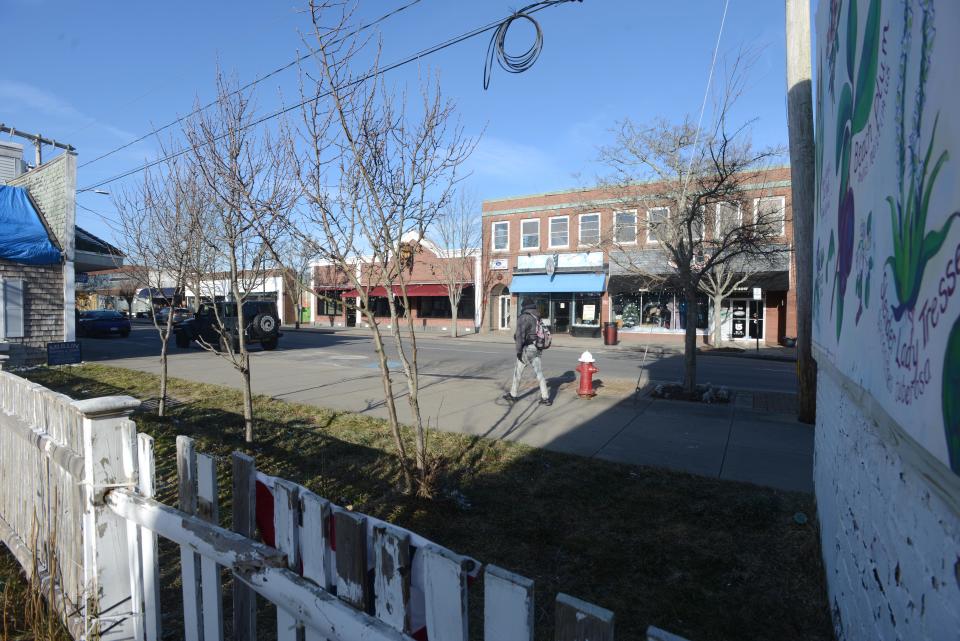Town council approves new downtown Hyannis zoning aimed at revitalization
HYANNIS — Zoning changes aimed at lighting a spark for revitalizing the heart of Hyannis got the Town Council's vote of approval Thursday night.
The support came following a nearly four-hour public hearing where the overall sentiment was in favor of the changes. Councilor Jeffrey Mendes summed up the thoughts of others, saying "without this our downtown is going to die."
Elizabeth Jenkins, director of the Barnstable Planning & Development Department, said the zoning is "a great foundation" for revitalizing downtown Hyannis by encouraging private investment in housing and development of underused property and attracting "a wide diversity of people."

Specifically, the new zoning repeals the “Hyannis Village Zoning Districts” and replaces them with revised and updated districts collectively known as the “Downtown Hyannis Zoning Districts."
Jenkins said the proposal was reviewed by the Planning Board, as well, and was the subject of several public comment sessions before the planners unanimously voted to forward it to the Town Council.
New zoning aimed at Hyannis downtown revitalization
The keystone to revitalization is mixed retail and residential uses in the heart of Hyannis.
Established in 2006, the existing Downtown Growth Incentive Zone was to direct new investment and new growth away from sensitive natural resource areas and toward areas with existing infrastructure, Jenkins said. But it didn't go far enough, she said, and did not produce the level of residential development planners had hoped.
"It's also important to remember is it not just about growth and development," she said. Its aim is also "to create a vibrant, walkable and sustainable place at the heart of Cape Cod."
Work to formulate the changes was not initially about zoning, Jenkins said, "but about planning and design, and redeveloping underutilized properties, thereby working within existing building footprints and retrofitting existing structures."
A square 'rotary' for downtown Hyannis? Planners share their ideas
Kate Maldonado, assistant director of Planning & Development, said the zoning changes introduce predictable form and enhanced character of the area, support increased housing production, "greens" the urban environment, emphasize place over parking and enhance building standards.
One of the key goals of the new zoning is "top-of-shop" housing, with homes above businesses. That also includes converting underused buildings, such as former office space, into housing.
New Hyannis zoning streamlines permitting
One of the key components of the new zoning is streamlined permitting. Jenkins called this "a significant incentive" for property owners to invest in redevelopment and infill opportunities — that is, building on or retrofitting under-used or unused parcels.
"We can no longer keep our permitting/regulatory process and expect investment," she said.
Hyannis has seven new zoning areas
The plan creates seven zoning districts within the Growth Incentive Area around downtown.
There are two so-called "form-based" districts: Downtown Main Street and Downtown Village.
Maldonado explained that form-based zoning "is focusing on form as opposed to land use." The zoning emphasizes dimensional standards that result in a predictable form, she said — an important factor when it comes to infilling so there is cohesiveness.
New vision: Turning Hyannis Main Street into a 'Great Street'
The plan will allow for buildings up to four stories, though fourth stories are required to be recessed a minimum of 8 feet to minimize their visibility from the street. The recessed area, said Maldonado, could be used as a balcony.
Jim Kupfer, senior planner for planning, zoning and historic preservation, said the downtown village district aligns around Main Street, with an aim "to create supportive housing for our business" and to "create a welcoming, walkable community for us to enjoy, live, work and play."
The other zones are "hybrid" districts that focus on traditional patterns with some new enhancements in terms of landscaping, Kupfer said, noting "they outskirt the main spine of our Growth Incentive Zone." They include: Downtown neighborhood, downtown hospital, Hyannis Harbor, transportation center and highway commercial.
Kupfer noted the Hyannis Harbor district remains mostly untouched, though the zoning does aim to enhance landscaping and parking there, as well as in other zones.
Landscaping emphasized in new Hyannis zoning
The new zoning puts more emphasis on landscaping features. While zoning already called for buffers through landscaping, the new plan includes specifications for populating green spaces.
The new zoning, Maldonado said, "specifies plant material," and calls for consistent vegetation "that's dense and diverse" in size and type.
Besides their aesthetic value, there are important benefits to enhancing the landscaping rules for development, she said. More greenery results in better air quality and stormwater management, and also has a cooling effect not only on the buildings but the areas around them, she said.
Essentially, it helps prevent so-called urban heat islands, areas of elevated temperature owing to reflection — rather than absorption — of the sun's heat by buildings, sidewalks and roads.
Shared, hidden parking a goal of new zoning
When it comes to parking, the new zoning "emphasizes place over parking," said Kupfer.
Rather than maximizing parking and creating large lots where spaces may often go unused, the zoning focuses on minimizing parking standards and incorporating shared parking areas.
"We're trying to utilize the parking more efficiently than what we have out there today," he said.
A place to live:Cape Cod strip malls could help with housing crisis. Here is one in Yarmouth.
Currently, there is "lots of parking out front" with large setbacks. The new zoning encourages buildings closer to the street, with shared parking spaces hidden in the back.
Several locations in the east end of Hyannis with parking lots on the street "create 'missing teeth' in the urban fabric, Jenkins said. While parking serves an important need, in some cases it may not be the highest and best use, or could be made more efficient, she said.
"We are scaling back the amount of required parking that new developments must adhere to," Jenkins said.
Creation of compact housing in Hyannis
According to the planning department's description of the zoning initiative, current zoning allows for multi-family residential development, but very few residential units have been permitted by-right. The zoning revisions "strive to allow for efficient models of compact housing by-right through a code crafted to correspond with the historic development patterns of downtown Hyannis.
The focus of the revised zoning, according to the planning office, "is to create a predictable regulatory framework that encourages compact residential development, compatible with traditional development patterns, meeting a range of housing needs. "

The zoning revisions are based on comments received during the Community Resiliency by Design community engagement process, which produced a report on Village of Hyannis design preferences, the planners said. That report included public comments on preferred types and styles of building massing, scale, character and composition. This zoning amendment is also supported by the Cape Cod Commission’s Form Based Code Framework, which advocates for the use of form-based and hybrid zoning to help deliver context-appropriate densities in forms that respect existing historic development patterns.
For more details, visit https://tobweb.town.barnstable.ma.us/BoardsCommittees/TownCouncil/Agendas/2023/02-02-2023_Town_Council_Agenda.pdf
Contact Heather McCarron at hmccarron@capecodonline.com.
Stay connected with Cape Cod news, sports, restaurants and breaking news. Download our free app.
This article originally appeared on Cape Cod Times: Barnstable Town Council approved new zoning for downtown Hyannis

